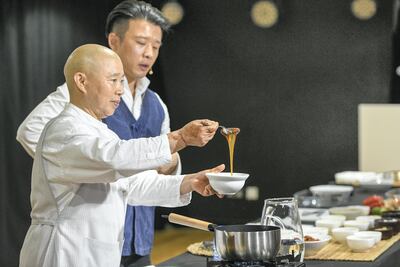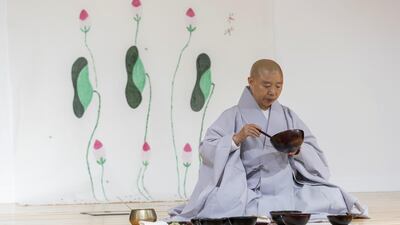Netflix show Chef's Table introduced her to the world, but, for Jeong Kwan, cooking was never about impressing an audience. After appearing on the hit series in 2017, the Buddhist nun has travelled to different countries (including, recently, the UAE) to share her popular take on Korean temple food – the meals eaten by monks and nuns in Buddhist monasteries – with the world.
If you Google her name, there's no shortage of articles praising her cooking abilities, but if you ask her, she doesn't consider herself a chef, but rather a nun who just happens to be very good at cooking. After all, she has no formal culinary training and has never worked in a restaurant. And yet, at the two events she hosted as part of the Korea Festival in Abu Dhabi, she drew in a full house. She led a cooking class and a Barugongyang (meditative eating) session at the Korean Cultural Centre. Even though she doesn't speak any English, those who got to see her in person soon learnt she can tell quite a story through her food, as she turns simple items into beautifully crafted dishes.
Korean food has seen a rise in popularity over the past decade, but Kwan's style of cooking has also got people talking. While the cuisine is known for its bulgogi (marinated beef strips), dukbokki (spicy rice cakes) and japchae (stir-fried noodles) – all dishes full of spices and flavour – temple food is pretty much the opposite. It is toned down and pared back, with the plant-based recipes relying on nature for their ingredients. They're full of flavour without offending or being too aggressive on the senses. Kwan uses many all-natural seasonings, avoiding anything "instant", and grows all her own food at the temple.
Besides animal products, Kwan also never uses five other ingredients in her cooking – garlic, onions, scallions, chives and leeks. Some Buddhists believe they are too pungent and prevent a state of calmness, providing a distraction from reaching a meditative state. "Temple food is deeply connected to spiritual energy," Kwan tells The National. "The point of which is to keep a person's mind calm and static."
At her session in Abu Dhabi, Kwan demonstrated how she uses fermentation to create a cabbage-tomato kimchi. With locally sourced ingredients, she also put together a dried persimmon salad with Korean wild blackberry syrup, and shiitake mushrooms boiled in soy sauce and grain syrup. Both are delicious, but the persimmon salad in particular is a well-balanced plate, with varying textures and a touch of sweetness.

She's developed this lightness of touch in the kitchen over many years, as Kwan first discovered her love of cooking at a young age, watching her mother prepare meals for the family. She was raised with her six siblings on a small farm, and one day, while her parents were out, Kwan decided to cook a meal. When her parents returned, they were surprised to see she had made them noodles. Her mother asked where she learnt to make it, and she replied: "I learnt from watching you, to make you happy."
This close relationship she had with her parents influenced who she would later become. Ultimately, it was in losing her mother that she found her path towards Buddhism. She died suddenly when Kwan was only 17 years old, and she remembers being terribly upset. "Thinking of not having my mother in my life, I thought life would be meaningless," she says.
After she became a nun, Kwan found she still missed her mother, so to overcome her sadness, she turned to cooking. It was there, in the kitchen, that she realised her feelings could be turned into a source of energy.
One day, her father visited her at the temple, questioning how she could live the way she does. "You're not eating any good, tasty food," he said. "There's no meat, no fish. There's only kimchi." He suggested they go home, but she wanted to show him that temple life was right for her. Kwan cooked a shiitake mushroom meal for her father and told him to eat it in the mountains of the valley. Afterwards, he admitted he had "never tried anything like this before" and realised she had found peace. He left her at the monastery, knowing she would be OK, and a week later, he died in his sleep.
"Even today, when I see something beautiful or make or see beautiful food, I thank my parents for their energy and virtue," she said during her Chef's Table episode. "The food I prepare is an expression of gratitude to my parents. They let me become who I am."
She also focuses on bringing together people of different backgrounds, which is why her trip to Abu Dhabi was so successful. After spending a couple of days in the capital, Kwan said she felt comfortable. Her mind was “at ease, thanks to the good weather” and, when visiting the Sheikh Zayed Grand Mosque, she noticed how everyone lived together in peace.
"Life is the same, regardless of religion," she tells us. "I felt that when I was in the mosque, the whole world connects – the world is connected. Although I'm a Buddhist nun, I was free to go to the mosque and I was impressed. Abu Dhabi as a city is peaceful and I'm happy to have been here."


